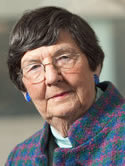Factors of complicated grief pre-death in caregivers of cancer patients Journal Article
| Authors: | Tomarken, A.; Holland, J.; Schachter, S.; Vanderwerker, L.; Zuckerman, E.; Nelson, C.; Coups, E.; Ramirez, P. M.; Prigerson, H. |
| Article Title: | Factors of complicated grief pre-death in caregivers of cancer patients |
| Abstract: | Purpose: Over the past decade, Prigerson and her colleagues have shown that symptoms of 'complicated grief' - intense yearning, difficulty accepting the death, excessive bitterness, numbness, emptiness, and feeling uneasy moving on and that the future is bleak - are distinct from depression and anxiety and are independently associated with substantial morbidity. Little is known about complicated grief experienced by family caregivers prior to the death. This study sought to examine differences in caregiver age groups and potential risk factors for complicated grief pre-death. Method: Two hundred and forty eight caregivers from multiple sites nationwide (20-86 years of age) identified themselves as primary caregivers to a terminally ill cancer patient. Each caregiver was interviewed using the following measures: the Pre-Death Inventory of Complicated Grief-Caregiver Version; the Brief Interpersonal Support Evaluation List; the Structured Clinical Interview for the DSM-IV Axis I; the Life Orientation Test-Revised; the SEPRATE Measure of Stressful Life Events; the Covinsky Family Impact Survey; and mental health access questions. Results: The study found that those under 60 years old had higher levels of complicated grief pre-death than caregivers 60 and older (t(246) = 2.30, p < 0.05). Significant correlations were also found between levels of complicated grief pre-loss and the following psychosocial factors: perceived social support (r = -0.415, p < 0.001); history of depression (r = -0.169, p < 0.05); current depression (r = -0.158, p < 0.05); current annual income (Spearman rho = -0.210, p < 0.01); annual income at time of patient's diagnosis (Spearman rho = -0.155, p = 0.05); pessimistic thinking (r = 0.320, p < 0.001); and number of moderate to severe stressful life events (Spearman rho = 0.218, p = 0.001). In a multi-variate analysis (R2 = 0.368), pessimistic thinking (Beta= 0.208, p < 0.05) and severity of stressful life events (Beta = 0.222, p < 0.05) remained as important factors to developing complicated grief pre-death. Conclusions: These results suggest that mental health professionals who work with caregivers should pay particular attention to pessimistic thinking and stressful life events, beyond the stress of the loved one's illness, that caretakers experience. Additionally, although not reaching significance, mental health professionals should also consider younger caregivers at greater risk for complicated grief pre-loss. Copyright © 2007 John Wiley & Sons, Ltd. |
| Keywords: | anamnesis; cancer patient; neoplasms; diagnostic and statistical manual of mental disorders; health survey; oncology; risk factor; questionnaires; social support; depression; affect; correlation analysis; health practitioner; death; stress; caregiver; mental health; life change events; income; social psychology; attitude to death; grief; family; caregivers; factor analysis, statistical; pessimism; structured interview; interpersonal relations; mental health services; complicated grief; terminal disease; pre-death; expressed emotion |
| Journal Title: | Psycho-Oncology |
| Volume: | 17 |
| Issue: | 2 |
| ISSN: | 1057-9249 |
| Publisher: | John Wiley & Sons |
| Date Published: | 2008-02-01 |
| Start Page: | 105 |
| End Page: | 111 |
| Language: | English |
| DOI: | 10.1002/pon.1188 |
| PUBMED: | 17443644 |
| PROVIDER: | scopus |
| PMCID: | PMC2515552 |
| DOI/URL: | |
| Notes: | --- - "Cited By (since 1996): 15" - "Export Date: 17 November 2011" - "CODEN: POJCE" - "Source: Scopus" |
Altmetric
Citation Impact
BMJ Impact Analytics
Related MSK Work






